Design
MA
Postgraduate degree
Develop genuine skill, understanding and confidence, and take your practice to a professional level with our MA Design.
- Reach your creative potential through exciting professional projects and exhibitions.
- Learn from accomplished design professionals, with excellent academic and technical support.
- Work in dedicated studio spaces and benefit from excellent workshop and fabrication facilities.
MA Design encourages a healthy interplay of approaches and ideas across the visual design and the applied arts. You may want to explore a particular design interest on the programme, or select a pathway in Visual Communication, Graphics, Textiles or Illustration.
This is a practical design course, grounded in developing skills in all areas of professional, critical and research process. We encourage you to work both independently and collaboratively, alongside students specialising in range of areas including fine art photography, painting, media and ceramics.
Over the course of the programme, you'll build a build a strong professional approach to your practice, and you’ll demonstrate this in a public show of your final MA project at the end of the programme.
On successful completion of the course, your new abilities will be clearly evident in the portfolios you’ve developed, and your increased confidence will help you to prepare your move into industry or to continued studies.
What you'll learn
Working alongside other postgraduate students from Textiles, Visual Communication, Illustration, Graphics and Fine Art pathways, you’ll develop your own projects while undertaking practice-led research, theory and professional practice modules.
Specialist tutors and technicians will guide your progress, supporting you to create your own approach and make coherent and visually exciting design outcomes.
You'll use subject-specific studios and workshops and have access to technical equipment, specialist software and computers. Our excellent art and design library provides access to printed books, ebooks, magazines and periodicals and a range of other resources through interlibrary arrangements. You will be supported by a very enthusiastic team and a dedicated art and design librarian.
The Master’s programme culminates in a public exhibition. Our aim is for you to graduate with a broad, informed outlook, a genuine confidence in your abilities built through experience and the professional skills necessary to succeed in your chosen specialism.
This Design Master’s runs over one year and is divided into three trimesters.
Trimester one
From the start of the programme we encourage playfulness and risk-taking. You’ll begin by making work that responds to a range of instructions in ways that will help you to interrogate your practical approach, and to learn from lecturers and other students as you progress. You'll develop primary and secondary research that will feed directly into your practical work and assessments, and the project that you produce will form the basis of your developing practice.
We introduce a range of key issues in design and communication practice that allow you to explore how your specialist pathway relates to the wider field and to gain professional, critical and collaborative working skills.
Trimester two
Maintaining an experimental approach, you'll consolidate what you are learning and begin to narrow your focus within your chosen pathway or subject area. Academic staff will help you evaluate your development and refine your approach to support your project outcome. You’ll be encouraged to scrutinise the way in which your project functions and engages its audience. With help from our excellent subject specialists, technical demonstrators and technicians, you will hone the conceptual, technical aesthetic and contextual components of your project.
Trimester three
In the final trimester, you will work exclusively on your Masters Project. This is a self-directed, double weighted practice module in which you’ll be focussing your attention on your final Degree Show. By this stage you will have established a line of enquiry for your practice and will be working to a proposal for the show that you have developed. You’ll work in the studio with increasing independence to produce a body of work that demonstrates your advanced knowledge and understanding of your professional practice. The final MA Show exhibition will take place at the Locksbrook campus and will be open to the public.
This course includes or offers the following modules. Please check the programme document for more information on which modules are core, required or optional.
- Research Methods
- Theory and Professional Context
- Practice 1 (Design)
- Research Practice
- Theory and Professional Practices
- Practice 2 (Design)
- Master's Project
At BSU, our courses are designed to equip our graduates with the knowledge and skills they’ll need for the real world. To do this, we are continually improving our courses by responding to feedback from students and other stakeholders. This may mean changes may be made to the curriculum. You’ll always be given notice of any such changes.
For more information on how we approach such changes at the university, please read our policies on
Your progress is evaluated by formative assessment (throughout the duration of the course) and summative assessment (at the end of each trimester), through a mixture of exhibitions, verbal/visual presentations, research folders/blogs and written assignments.
You’ll learn through lectures, seminars, workshops, talks, individual and group tutorials, studio critiques and self-directed study.
Throughout the year visiting lecturers and professionals, designers and artists, visit the campus and give talks and seminars. You will have the opportunity to attend many of these. They will help you determine where your current practice sits within industry.
Our collaborative structure also means that you’ll learn from each other – for instance, Illustration, Photography, Textiles or Painting students might engage in debates with a range of other Art and Design students.
Technical Demonstrators, who manage our workshop facilities, provide teaching and support across a wide range of subject specialisms. Your learning is also supported by specialist librarians.
To find out more about how we teach and how you'll learn, please read our information on Your Learning and Teaching at BSU.
Online gallery of student work
Check out some of our student work from both the MA Fine Art and MA Design programmes at Bath Spa.
Opportunities
When permitted, Bath School of Design offers fieldwork opportunities throughout the academic year.
Our students have worked with a range of organisations incuding: The Holburne Museum, New Designers, British Ceramics Biennial, Collect, Ceramic Art London, The Contemporary Craft Fair, and Bath Royal Literary and Scientific Institute.
Career opportunities may involve utilising skills in digital two and three dimensional design, infographics and graphic design, typography, branding and roles such as:
- Illustrator
- Graphic Designer
- Visual Communicator
- Textile Designer
- Interior Designer
- Photographer
- Picture Editor
- Art Director
- Multimedia Artist
- Animator
- Set and Exhibition Designer
- Picture researcher
Develop a wealth of indispensable digital skills that you can take into your future career. One of only three Adobe Creative Campuses in the UK, we provide all Bath Spa students with access to the full Adobe Creative Suite, giving you the tools to communicate creatively, whatever your course or chosen professional field.
Former teacher and Bath Spa University MA Design (Textiles) graduate Kamal Ali has used his professional creativity to solve an age-old problem, by inventing the world’s first patented interactive prayer mat.
Kamal said: “Bath Spa University was a platform that gave me the confidence to push boundaries, with the aid of some amazing tutors, to turn my business into what it is today. Ultimately, what makes our little company different is creativity. Creativity is implemented in everything we do.”
Bath Spa graduate creates world’s first patented interactive prayer mat
Facilities and resources
You’ll benefit from access to comprehensive digital workshops and specialist art and design facilities, including:
- Our student service point at Locksbrook where you can purchase subsidised art and design materials, hire out equipment for free and collect Library resources
- Access to our well-stocked Library at Newton Park
- Specialist technical workshops across all of art and design
- Access to studio space where you can work on projects and refine your practice
Locksbrook campus
Locksbrook Campus is a Grade II listed building designed by Nicholas Grimshaw in 1976. It has now been transformed into an innovative, open plan space, redesigned to meet 21st century environmental standards, with technical workshops surrounded by flexible studio spaces and large social areas.
Locksbrook has received both a RIBA South West Award 2021 and RIBA National Award 2021, recognising and celebrating what an amazingly inspirational space it is to come together to design, make, do, create and learn in.
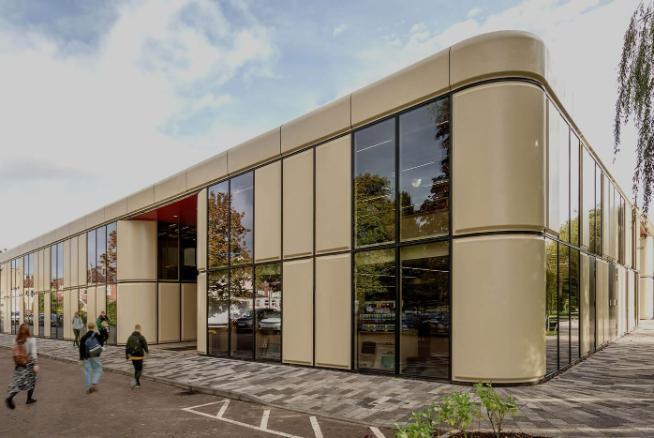
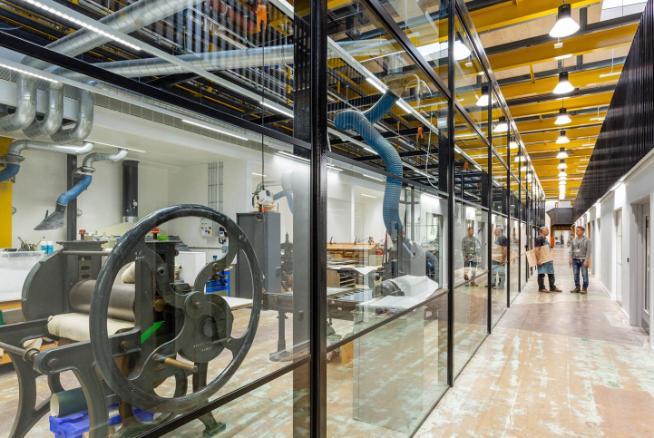
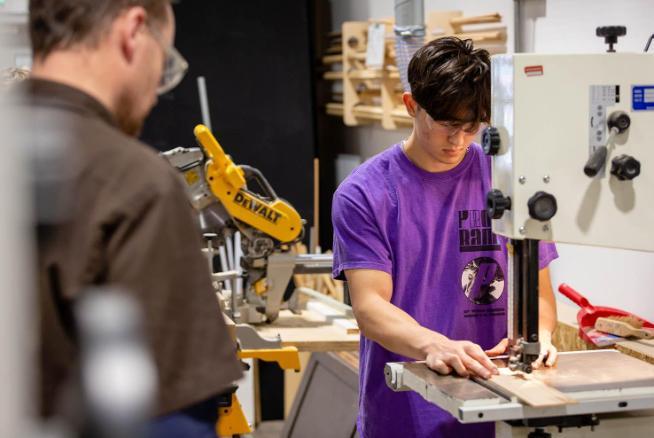
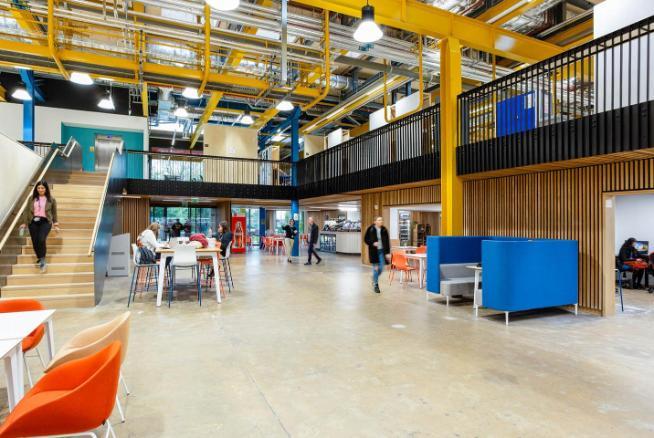
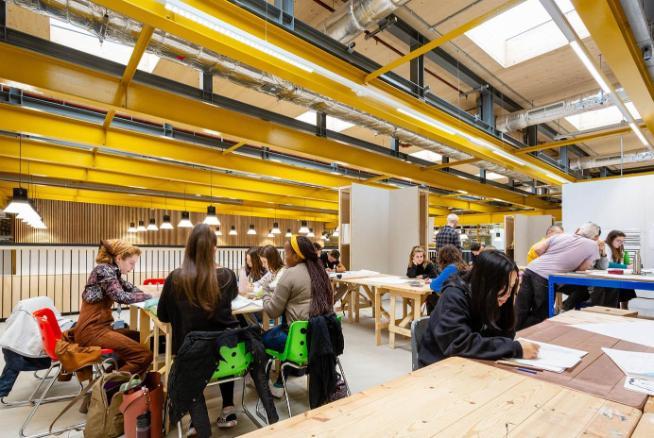
Fees
| Student | Annual tuition fee |
|---|---|
| UK full time | £10,465 |
| UK part time | £5,233 |
| International full time | £19,520 |
Additional course costs
You may need to pay additional course costs over and above your tuition fees, for example, for specialist equipment or trips and visits. Please check the course Programme Document (linked under the main image on this page) for details of any additional costs. You can also read our Additional Course Costs Policy for further information.
Funding opportunities
Please visit our Funding pages for an overview of the funding options that may be available, including scholarships and bursaries.
Interested in applying?
We're looking for energetic and self-motivated individuals who can work on their own but also see the value in working in collaboration with others. They should enjoy asking questions and solving creative problems.
You’ll need a good undergraduate degree in a design, visual communication or art specialism, or its equivalent in terms of learning or experience, and a good working knowledge of design, visual communication or art contexts. See our Accreditation of Prior Learning (APL) web page to learn more.
Fundamentally, you’ll be selected on your ability to thrive on this course, as demonstrated by your portfolio and interview.
Ready to apply? Click the "apply now" button in the centre of this page.
Need more guidance? Head to our how to apply webpages.
Interviews can be conducted onsite or online with a digital portfolio.
When to apply
Many of our postgraduate courses have a limited number of student spaces. To avoid the disappointment of the course being full, we recommend that you apply now.
Late applications (generally those made after 31 July) will only be considered if places remain on the course.
Need more information or still have questions? Contact us to discuss your situation.
Course Leader: Andrew Southall
Email: a.southall@bathspa.ac.uk
Masthead image: Carolina Sanchez
- Award
- MA Design
- School/s
- Bath School of Design
- Campus or location
- Locksbrook Campus
- Course length
- One year full-time or two years part-time.
Entry requirements
Entry requirements for our postgraduate courses vary. We're generally looking for a good honours degree or equivalent.
Some courses also require an interview or the submission of a portfolio of work.
Please contact our admissions team for more information: admissions@bathspa.ac.uk.



